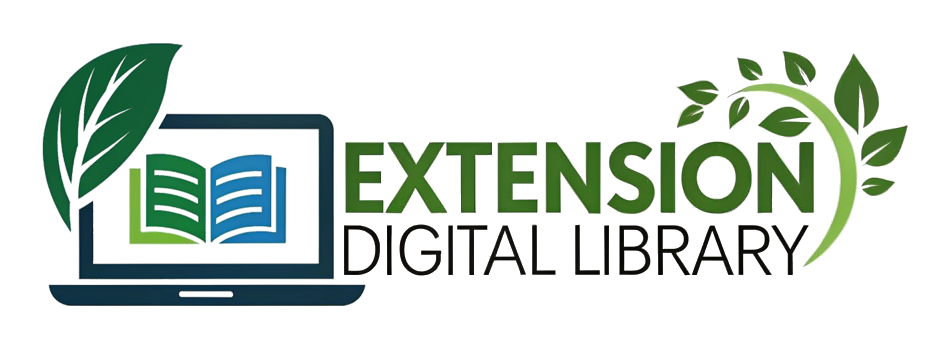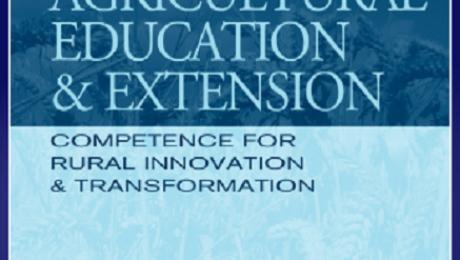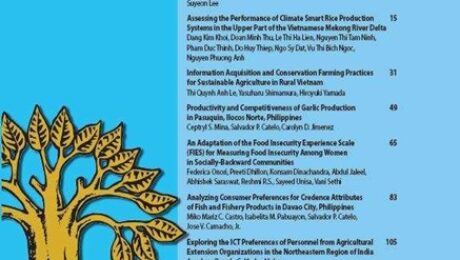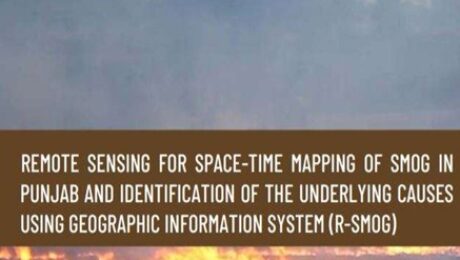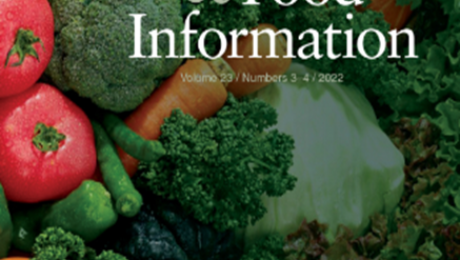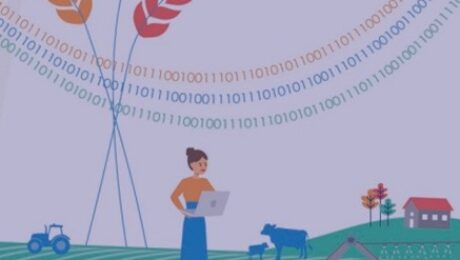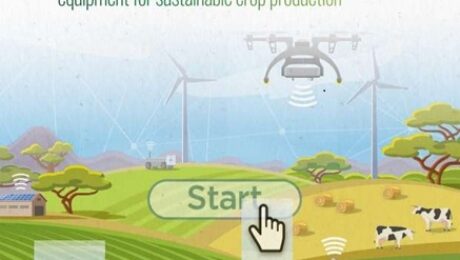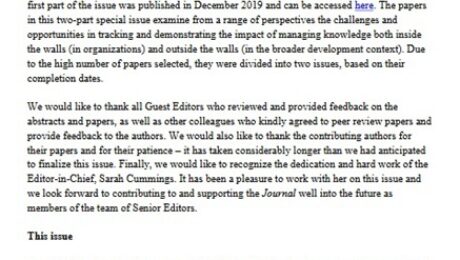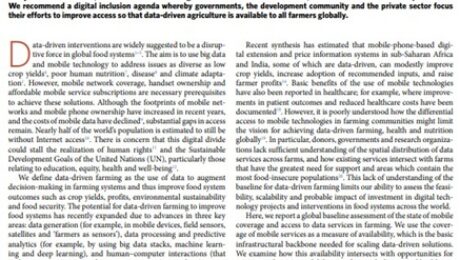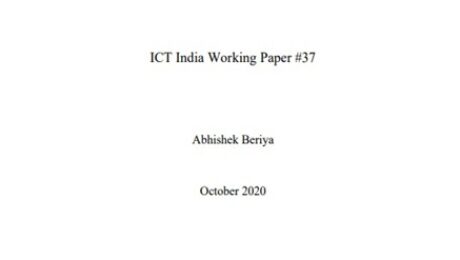Digital and virtual spaces as sites of extension and advisory services research: social media, gaming, and digitally integrated and augmented advice
The field of research on agricultural and rural extension and education, also referred to as advisory services and intermediaries, has always engaged with different aspects of the spaces in which agricultural producers (farmers, growers, ranchers) are situated and operate. In this editorial, I will reflect on the elements and environments which jointly constitute and shape the farm (Darnhofer 2020) and their connection with extension and advisory services in the digital age, opening up new digital and virtual spaces. Extension and advisory services receive ample consideration in current debates on digitalization and digital transformation of the agrifood sector, and are an important focus of attention for agriculture and food systems research, practice and policy (Ehlers, Huber, and Finger 2021; Ingram and Maye 2020; Klerkx 2020). In what follows, I will elaborate on some digital and virtual spaces as sites of extension and advisory services research, to progress the field of study for which The Journal of Agricultural Education and Extension serves as a publication outlet.
Exploring the ICT Preferences of Personnel from Agricultural Extension Organizations in the Northeastern Region of India
Although the public extension system in India is known to be one of the largest in the world, it still lacks coordinated effort in managing the links between research, extension, and farmers, resulting in non-uniform distribution of agricultural knowledge and technology. A vast majority of the population earning their livelihood through agriculture remain small and marginal farmers. Lack of computerized networks in agricultural extension departments, inadequate skilled manpower for disseminating agricultural information, and increasingly diverse needs of farmers across the Indian sub-continent pose hurdles in effective information transfer to the farming community. The use of information and communication technology (ICT) tools exerts a positive impact on agriculture worldwide by aiding speedy and effective dissemination of agricultural information. Increased awareness of modern ICT tools and their usage will contribute substantially to strengthening the extension network and expand its scope. This study explored the ICT preferences of personnel from agricultural extension organizations employed in public extension organizations in the north-eastern region of India. It found that electronic media is ranked below the conventional extension contact modes of print media and personalized contact regarding its use for disseminating agricultural information by the extension personnel. Demographic characteristics of the personnel from agricultural extension organizations such as sex, age, education, specialization, designation, and work experience were significantly associated with the pattern of ICT use specifically experience with ICT, frequency of use, training, and voluntary use.
Remote sensing for space-time mapping of smog in Punjab and identification of the underlying causes using geographic information system (R-SMOG)
Food and Agriculture Organization of the United Nations, Pakistan initiated the Technical Cooperation Programme on Remote Sensing for Spatio-Temporal mapping of Smog (R-SMOG) upon the request of the Government of Punjab. The R-SMOG evaluates the relationship between Smog and the rice residue burning practices by farmers in the Rice belt of Punjab. It is a comprehensive geospatial research which integrates Spatio-temporal mapping of smog viz-a-viz climatological modelling, study of seasonal trends and dynamics and estimates an inventory of sectoral emissions. The findings of the R-SMOG will assist to generate scientific evidences to study the causes of Smog in Punjab and to adopt adequate mitigation and adaptation strategies.
Tracing Hybridity in the Provision of ICT-Enabled Agricultural Weather Information Services in Ghana
This study investigates the hybrid informational governance arrangements involved in the provision of ICT-enabled Weather Information Services (WIS) for farming in Ghana. Farmers and organizations providing WIS were interviewed. Findings show that multiple technologies are used by combinations of government, business, and civil society organizations to provide various WIS for farming. The ICT has facilitated the creation of different hybrid informational governance arrangements, categorized as multiplicity, intertwinement, and coalescence, which permits flows of WIS across scales, from international non-state organizations to farming communities, often by-passing national and district-level government organizations. Government organizations remain key players in the provision of WIS.
What’s Cooking : Digital Transformation of the Agrifood System
The digital agriculture revolution holds a promise to build an agriculture and food system that is efficient, environmentally sustainable, and equitable, one that can help deliver the Sustainable Development Goals. Unlike past technological revolutions in agriculture, which began on farms, the current revolution is being sparked at multiple points along the agrifood value chain. The change is driven by the ability to collect, use, and analyze massive amounts of machine-readable data about practically every aspect of the value chain, and by the emergence of digital platforms disrupting existing business models. All this allows for drastically reduced transaction costs and pervasive information asymmetries that plague the agrifood system. The success of the digital transformation, however, is not guaranteed as the risks it brings are numerous, including those related to data governance and inadequate competition within and between digital platforms. What’s Cooking: Digital Transformation of the Agrifood System investigates how digital technologies can accelerate the transformation of the agrifood system by increasing efficiency on the farm; improving farmers’ access to output, input, and financial markets; strengthening quality control and traceability; and improving the design and delivery of agriculture policies. It also identifies a key role for the public sector in maximizing the benefits of this process while minimizing its risks, through enabling an innovation ecosystem featuring open datasets, digital platforms, digital entrepreneurship, digital payment systems, and digital skills and encouraging equitable technology adoption.
Agriculture 4.0 – Agricultural robotics and automated equipment for sustainable crop production
This report presents and reflects on the opportunities that new technological developments related to automation and precision agriculture (e.g. robotics) can offer to agriculture in developing countries. These technologies are mainly targeted to support farmers that struggle with the cost of labour when harvesting crops and to tackle the declining availability of manpower for general cropping operations. This report also explores the possible applications of agricultural technology, presents the current trends and discusses some of the principle challenges to successful adoption for sustainable agricultural mechanization in developing countries.
Challenges and opportunities in measuring knowledge management results and development impact
The papers in this two-part special issue examine from a range of perspectives the challenges and opportunities in tracking and demonstrating the impact of managing knowledge both inside the walls (in organizations) and outside the walls (in the broader development context). Due to the high number of papers selected, they were divided into two issues, based on their completion dates. We would like to thank all Guest Editors who reviewed and provided feedback on the abstracts and papers, as well as other colleagues who kindly agreed to peer review papers and provide feedback to the authors. We would also like to thank the contributing authors for their papers and for their patience –it has taken considerably longer than we had anticipated to finalize this issue. Finally, we would like to recognize the dedication and hard work of the Editor-in-Chief, Sarah Cummings. It has been a pleasure to work with her on this issue and we look forward to contributing to and supporting the Journal well into the future as members of the team of Senior Editors.
The global divide in data-driven farming
Big data and mobile technology are widely claimed to be global disruptive forces in agriculture that benefit small-scale farmers. Yet the access of small-scale farmers to this technology is poorly understood. We show that only 24–37% of farms of <1 ha in size are served by third generation (3G) or 4G services, compared to 74–80% of farms of >200 ha in size. Furthermore, croplands with severe yield gaps, climate-stressed locations and food-insecure populations have poor service coverage. Across many countries in Africa, less than ~40% of farming households have Internet access, and the cost of data remains prohibitive. We recommend a digital inclusion agenda whereby governments, the development community and the private sector focus their efforts to improve access so that data-driven agriculture is available to all farmers globally.
Precision Agriculture to Digital Agriculture: A Literature Review
This paper tries to capture the evolution of Digital Agriculture based on the foundations of precision agriculture. The review of literature around the development of precision agriculture reveals that the data captured in the precision agriculture processes, if effectively used, can support extensive agronomic decision making. With the advent of artificial intelligence and machine learning (AI/ML), predictive and prescriptive analysis of even huge amounts of data is now possible. Digital Agriculture seeks to combine the power of AI/ML and data from precision agriculture to deliver decision support systems to farmers and in other aspects of the agricultural value chain. The prerequisites for Digital Agriculture to realise its full potential are business models that demonstrate clear economic benefits for the farmers and user-friendly design.
Guidelines For Adoption of ICTS in Rural Extension to Face and Overcome Emergencies
The emergencies generated by the effects of climate change, the high conflicts in the continent, and now by COVID-19, challenge the Rural Extension services to external changes. Today, these emergencies threaten the possibility of maintaining supply chains and food security and the life and well-being of the population.
The risks generated by these emergencies require a new approach to the adaptation, mitigation, and action processes. There is no doubt about the leading role that ICTs play in this context since they facilitate action during moments of crisis and generate a sustainable plan for the post-emergency. In this scenario, this policy note indicates the elements that must be taken into account in a roadmap that allows the efficient incorporation of ICTs into Rural Extension.
